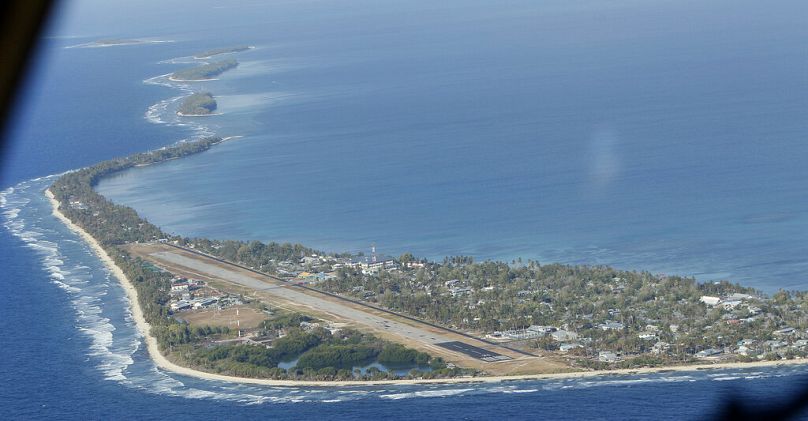Australia has offered the island nation of Tuvalu a lifeline to help residents escape the rising seas and increased storms brought by climate change.
At a meeting of Pacific leaders in the Cook Islands on Friday 10 November, Australian Prime Minister Anthony Albanese announced a plan that will initially allow up to 280 Tuvaluans to come to Australia each year.
 ADVERTISEMENT
ADVERTISEMENT
 ADVERTISEMENT
ADVERTISEMENT
Tuvalu has a population of 11,000, and its low-lying atolls make it particularly vulnerable to global warming.
"We believe the people of Tuvalu deserve the choice to live, study and work elsewhere, as climate change impacts worsen," Albanese said.
"Australia has committed to provide a special pathway for citizens of Tuvalu to come to Australia, with access to Australian services that will enable human mobility with dignity."
A 'groundbreaking' new treaty
Albanese described the new agreement as "groundbreaking" and said the day would be remembered as significant, marking an acknowledgement that Australia was part of the Pacific family.
He said the bilateral partnership between the two countries came at the request of Tuvalu. The new treaty is called the Falepili Union and is based on the Tuvaluan word for the traditional values of good neighbourliness, care and mutual respect
Tuvalu Prime Minister Kausea Natano said the new arrangement respected both nations' sovereignty and committed each country to supporting the other through such challenges as climate change.
Under the agreement, Australia has also committed to defending to Pacific nation from military aggression. Tuvalu has agreed it won't enter defence pacts with other countries without Australia's approval.
"I wish to express my heartfelt appreciation for the unwavering commitment that our friends from Australia have demonstrated," Natano said.
"This partnership stands as a beacon of hope, signifying not just a milestone but a giant leap forward in our joint mission to ensure regional stability, sustainability and prosperity."
Flooding and sea level rise threaten Tuvalu
NASA's Sea Level Change Team this year assessed that much of Tuvalu's land and critical infrastructure would sit below the level of the current high tide by 2050. The team found that by the end of the century, Tuvalu would be experiencing more than 100 days of flooding each year.
"Sea level impacts beyond flooding - like saltwater intrusion - will become more frequent and continue to worsen in severity in the coming decades," the team's report found.
Albanese said Australia would also add more funding to Tuvalu's Coastal Adaptation Project, which aims to expand land around the main island of Funafuti by about 6 per cent to help try and keep Tuvaluans in their homeland.
Tuvalu changed its constitution in September to say that its statehood would remain in perpetuity - even if the impacts of climate change or any other disaster result in the loss of its physical territory.
It also plans to build a digital version of itself, replicating islands and landmarks and preserving its history and culture as rising sea levels threaten to submerge the tiny Pacific island nation.
Asked by reporters if Australia would consider similar treaties with other Pacific nations, Albanese said the Tuvalu announcement was big enough for one day, and emphasized again it came at Tuvalu's request.
"This reflects Tuvalu's special circumstances as a low-lying nation that's particularly impacted, its very existence, by the threat of climate change," Albanese said.
Albanese's announcement came after Pacific leaders met for a retreat on the beautiful island of Aitutaki, which marked the culmination of meetings at the Pacific Islands Forum.











